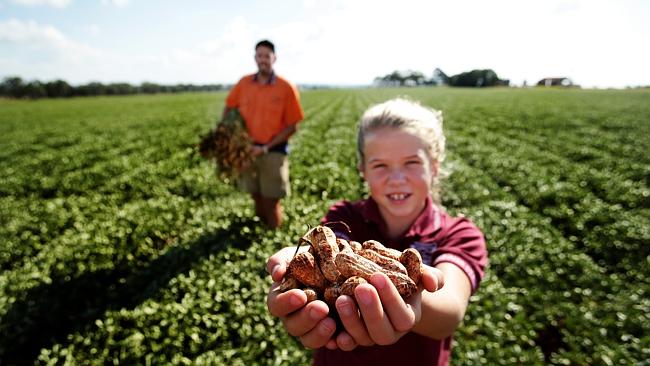CHEAP Asian seafood, expensive Italian and French cheeses and bean curd imports are regularly testing positive to toxic contaminants like E. coli, listeria, histamine and the organism that causes cholera.
An Indian cheese known as paneer and pepper also are regularly being uncovered as dangerous grocery items when put under the spotlight by Australian authorities.
Almost 9000 imported foods were found to be contaminated or containing prohibited or excess additives or antibiotics from scores of countries over the past five years.
There were also 125 cases of histamine picked up in fish, like fresh tuna, canned mackerel and dried fish – a contaminant that causes the potentially fatal Scombroid fish poisoning that struck down Sydney diners at a cafe last month.
But a range of foods that passed microbial tests contained pesticides, antibiotics, colourings and preservatives that are banned in Austraila.
Some of those cases include preserved vegetables and flowers from China and Korea that were dried with gamma irradiation and X-ray, which is not allowed.
It comes as the Department of Agriculture revealed it had introduced new testing for canned and preserved fruit in the wake of the Chinese frozen berry hepatitis A scare.
Canned fruit has not been screened for lead before, but a new test will come into place following concerns of land and water pollution overseas transferring to food, The Courier-Mail has confirmed.

Peanut Grower Sonie Crumpton and his daughter Lucy, 7, at their farm at Crawford, near Kingaroy. Mr Crumpton says it’s getting harder for Australian growers to compete with cheap imports. Picture: Mark Calleja Source: News Corp Australia
Experts are also warning a tide of cheap imported peanuts could be posing a cancer risk to Australian consumers.
Peanuts can harbour a naturally occurring fungus called aflatoxin which is known to cause liver cancer and even death.
While Australian growers and processors perform rigorous testing for the carcinogen, the same is not known of overseas growers.
Between January 2009 and June 2014, the Department of Agriculture found 122 cases of aflatoxin in imported foods containing nuts and sesame.
Imported peanuts are classed as a “high-risk” food and tested at a much higher rate than other produce.
Cheap imported nuts – especially from China – have been on the rise and used in everything from peanut butter to health bars and chocolates.
University of Queensland aflatoxin expert Dr Rao Rachaputi said consumers should be concerned about the increasing peanut imports from China, Thailand and Vietnam.
“Australian peanuts are routinely checked for aflatoxin contamination before they go for human consumption,” he said. “We are not sure if this step is there with peanuts coming in from overseas and which side of the border this happens.”
Food imported into Australia is not required to undergo the same level of chemical testing as domestic produce.
While Aussie farmers are subjected to extensive tests for up to 150 pesticides and veterinary chemicals, foreign produce is only checked for 49.
The double standard has been exposed amid heightened concern about imported food following the Nanna’s contaminated berries scandal.
Meanwhile, the Department of Agriculture has confirmed it does not routinely test for hepatitis A in any foods but yesterday updated its processes to test frozen berries for E.coli, as an indicator of hygiene.
With Australians buying more foreign-grown food than ever, shoppers have been warned they could be eating a cocktail of unknown chemicals on fruits, vegetables, meats, dairy and seafood.
Food Standards Australia sets the maximum limit of chemical residues allowed on food but most of those are not tested on imports by the Department of Agriculture.

Tainted eggs are to blame in many of the food poisoning cases in Queensland this year. Source: News Limited
In Queensland, bad eggs are the chief suspect in most food poisoning cases this year, health officials say.
Almost 2000 people have fallen ill with salmonella since the start of the year, including more than 600 from 13 outbreaks at restaurants, cafes and the Brisbane Convention and Exhibition Centre.
Dozens have been hospitalised with severe dehydration.
Queensland Health Protection Unit executive director Sophie Dwyer said tainted eggs were to blame in many of the cases.
“We have seen some cracked and dirty eggs on the market and that does increase the risk and that’s a concern,” she said.
“They (cracked eggs) contain organic matter on the outside and dirt and faeces, so that is going to contain bacteria that can easily contaminate hands and the rest of the kitchen.”
She said the popularity of raw egg-based foods and spreads increased the risk of poisoning.
Darling Downs Fresh Eggs has issued a voluntary recall of its caged and mountain-range free eggs but the producer was not believed to be linked to any of the outbreaks.
In a statement, the company said it issued the recall after being advised of a production issue with the eggs that had a Julian date of 036 up to and including 063.
“It was possible that dirty eggs may have been packed into some of these cartons and we are implementing a voluntary recall of these eggs,” the statement said.
Eggs with a Julian date before and after 036 and 063 were not affected.
Gold Coast cafe Grocer and Grind was issued a temporary closure order while the city’s council investigated a salmonella outbreak at its premises. The cafe assured customers it was distressed by the situation and was working with Queensland Health to rectify the situation.
Additional reporting – Kathleen Donaghey
